Justin Robinson's Blog, page 32
July 27, 2012
Liner Notes: Undead On Arrival
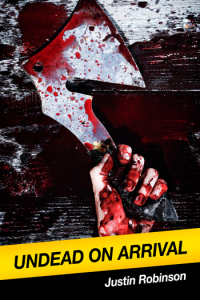
I was out walking one day. I think I was around chapter 16 in Mr. Blank , and was noodling through aspects of the story when a title popped into my head. Undead On Arrival .
“Well, shit,” I thought, “I’ve got to write that, don’t I?”
Turned out I did. I began hashing things out on that walk, starting an internal debate about whether this would be a comedy about a zombie detective on a quest for some missing brains, or a hard boiled zombie version of a noir classic. Though it’s the first of my books to be released in its entirety, UOA (as I called it in all my notes) was the third book I finished. So in development, a lot of it was a reaction to what I had previously written in Blank. The hero of that novel was a smart ass, a thinker, a pop culture junkie with a ridiculous haircut who couldn’t win a fight with a crippled kid. He was a Raymond Chandler protagonist by way of Quentin Tarantino, minus any hint of badassery. So I knew I had to write the exact opposite.
Glen Novak would be a thug. A brute of a man who would solve his own murder by basically kicking the living shit out of anyone and everyone in his way. He would be somewhat gullible (he gets lied to at several points and believes it), not especially bright, and more than anything, a violent bully. I knew that if I was going to have him solve his own murder, he needed a large pool of suspects or there’s no mystery. This meant making him less than a good man, and that was what I struggled with more than anything else. I had to make him loathsome enough so that a lot of people wanted him dead, but not so bad that someone reading the book would be cheering for it the whole time. I tried to make him a man corrupted by the world, but self aware enough to know he was corrupt. And making him the least evil of the three town fathers helped a little.
I knew I’d need to give my hero a gang, and I remembered something Shawn Ryan said when he talked about designing the Strike Team from The Shield: one character needs to be crazier than your hero, and one needs to be more normal. Stew became the normal one, and Pulaski was the nutball. Pulaski sort of sprang fully-formed from my head, and quickly became one of my two favorite characters to write. I mean, how do you not want to write about a transvestite killing machine? From there, I added Martinez because I wanted to have one of the most trustworthy people killed off early to build suspense.
In some ways, I regard the ending as a happy one. Yeah, Novak’s dead, but he was kind of a piece of shit anyway and along the way, he killed the worst of Devon. A lot of innocent people die too, but at the end of the day hope isn’t completely lost. In fact, Judy Bloch, who survives, is hope personified. She is the woman of science, the only one actually attempting to take a proactive stand against the undead. She’s also pregnant, which in itself is symbolic of hope. After Novak’s rampage, the people left alive include the best fighters in town (Ford, Sakimoto, Pulaski), all of whom have been shown to have more of a conscience than their leaders. The power vacuum can be filled with Bloch, Chris Stewart, and Gloria Wu, who are better people than the former town fathers by a large margin. The people of Devon have beaten back swarms before, and as long as they have the killing machines, hope is not lost.
The collapse of Devon is intended to mirror the systematic failure of Novak’s body to the infection, because in some ways, Novak is Devon. With the death of Calomiris, the swarm attacks in earnest, right when our hero was ready to kill himself. It’s raining for a similar reason, but also because of what Akira Kurosawa said about the rain in The Seven Samurai: it makes everything more desperate. When I was outlining the book, I included the advancement of the symptoms, the state of the weather, and the status of the coming swarm, ramping each one up with every chapter. The infection necessarily turned into body horror, but I was raised on Cronenberg films, so this was probably inevitable.
Okay, yes, this is a pulp novel. And yeah, I said “symbolic” earlier. Check out some of my horror reviews to see what I like to read into things. That being said, I intended characters to represent something larger than themselves. Calomiris and Rippey were business and religion respectively, while Novak was the individual (this is why his weapons were specifically hand tools). Trapped between the two extremes exploiting him, Novak is destroyed, although as the individual, he chooses suicide over joining the faceless mob of the undead. It’s not even presented as a choice: Novak knows he’ll kill himself as soon as he gets bitten. Meanwhile, hope lies in science, personified by Judy Bloch. I have no excuse for the zombie stage show. That was just me trying to think of how people might entertain each other in an ultra-jaded post-apocalyptic world.
As a pulp novel, I had to make sure that the damn thing moved. Art books can wallow in pretension, but we genre writers have to kick our books in the fucking head until they do what we want. It’s most important that UOA delivers a decent mystery and some lingering chills. Then you can get to the ridiculous artistic statement I tried to layer under a perfectly good noir story.
Now, if you liked Undead On Arrival, check out the masters. Other than the slide whistle, D.O.A. is a fantastic film (the remake isn’t bad either), and was the source of my title and the gimmick of the plot. The Black Dahlia (the Ellroy novel, not the de Palma abortion) also should not be missed and was a huge influence on the characters. Lastly, my zombies are of the Romero variety, so watch the Dead Trilogy if you haven’t already. And while you’re at it how about Zombie Ranch written by the Show’s Clint?
Oh yeah, and one of the things that’s hinted in the book, but never actually said… it takes place in 1990, with the end of the world happening in 1985. Look at what Novak wanted to watch on TV, what Pulaski listens to, and what Cheeseman complains about. Day of the Dead came out in ’85, so there’s my fake high five to Romero.
Until next time, creatures, remember: if a man takes your finger, take his head.
Filed under: Moment of Excellence, Puffery Tagged: hardboiled, Liner notes, noir, Undead On Arrival, zombies

July 20, 2012
Very Special Blossom: Blossom’s Blossoms
I have never become a woman. This probably isn’t much of a revelation, unless you thought I was some kind of werewoman, ready to go to Magic Mike every full moon. I’m not. Therefore, I don’t know what it’s like to become a woman. I’ve listened to Mrs. Supermarket’s descriptions (although she never uses that particular turn of phrase; her favorites include “falling to the communists” and “walking on the beach in soft focus”), but that doesn’t give me a clear understanding what it actually means, any more than telling a woman that a penis has a mind of its own and expecting her to truly understand that the fucker seriously has his own social calendar that has nothing at all to do with us. My point is that any speculation on authenticity will necessarily ring false. But then, if I had a problem talking out of my ass, I wouldn’t be writing a blog to begin with.
[image error]
Hey, there’s some really interesting opinions on Neil Marshall movies up here!
“Blossom’s Blossoms” aired on January 3, 1991 and was the first episode of the very first season. It is also a gritty reboot of the pilot. That’s right, Blossom the series is a gritty reboot of its own pilot. And you thought those were a new phenomenon. A decent chunk of the running time is spent to reestablish the premise of the series, with emphasis on what’s different, though to the writers’ credit, the exposition is fairly organic. Blossom’s siblings are the same, although Donnie has inexplicably been renamed Joey, which had the unfortunate side effect of ingraining the typecasting of Joey Lawrence as Joey Russo. Not that I think Lawrence is the type of guy to regale dinner party guests with a humorous critique of Virgil’s lesser works, but I don’t think he is mentally challenged.
Blossom’s parents have entirely changed. Her father is now a musician and was apparently never an accountant, while her mother has abandoned the family to pursue a dream of being a singer. Despite this decrease in income (accompanied by several jokes alluding to the family’s money troubles), they still live in the same palatial Valley home. The dad was also recast from Richard Masur (The Thing, License to Drive) to television stalwart Ted Wass. Lastly, the theme song, formerly Bobby Brown’s “My Prerogative” has been changed to something called “My Opinionation,” which sounds like a hip hop version of the Mr. Belvedere theme. This change turns Blossom’s already spastic dancing into something altogether more tragic as she is no longer on the beat. I can’t blame her for the dancing itself. Anyone who danced in the ‘90s looked like they were trying to remove anal beads without using their hands.
The plot of the episode mostly deals with drama created by the gritty reboot. See, Blossom is becoming a woman in a house full of guys, and just like me, none of them understand the delicate emotions involved with the uterine wall sloughing off its nurturing endometrium. Hey, don’t blame them. Joey can barely understand English, so we should cut him some slack. Anthony spends most of his time not drinking, so he gets a pass too. She is crippled with shame about the whole process, having a panic attack when she attempts to buy some tampons from the cute boy who works at the pharmacy (Giovanni Ribisi, credited here as “Vonni Ribisi” and before he exclusively played twitchy weirdos). The point is that Blossom wants to talk to the one person who could possibly understand.
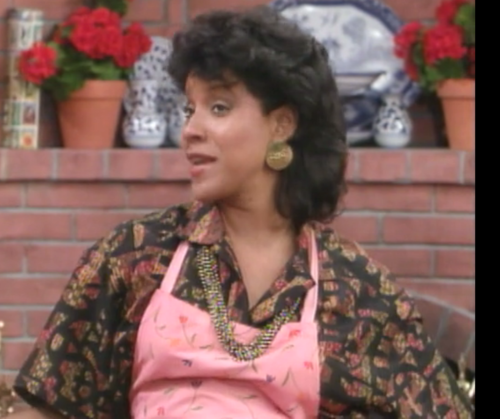
Claire Fucking Huxtable.
No, seriously, Blossom has a dream sequence in which Phylicia Rashad appears as her mom. I actually really liked this part, although probably not entirely for the reasons the creators intended. Mrs. Rashad is really the perfect choice, as Claire Huxtable was the TV mom for this generation, with only Meredith Baxter giving her a run for her money. The show is clearly having fun with the idea that — can you believe it? — a white girl might look to a black woman as a mother figure! Someone call the vicar! I always enjoy little moments of regressive racism in old television, especially when it is as well-intentioned as this is. That element is there, but it is clearly secondary. Blossom looks up to Claire Huxtable because she is in the right generation, grounding the character and show in the zeitgeist. And it was a great opportunity for some stuntcasting, borrowing a little of Rashad’s credibility on a fledgling show.
The real brilliance of the scene is that it turns into a health class lecture on what precisely happens during menstruation, only instead of your weird health teacher, it’s Claire Huxtable, and she’s illustrating her talk by drawing a diagram of the uterus in frosting. Some of the humor there is intentional, but I was far more amused by the idea that someone thought that this was entertainment. “We’re going to help a whole generation of girls with their periods.” “But how?” “Four words. Claire Huxtable frosting diagram.”

This mescaline coffee is delicious!
It’s a bit of sweet natured insanity, the earnestness of the ‘80s somehow combining with the nascent pop culture obsession of the ‘90s to make a moment. The one disappointing part was we never got to see a uterus done up in frosting, little roses at the corners. Of course, then we’d be treading in the terror awakened by that Tom Petty video that traumatized all of us back then.
Filed under: Projected Pixels and Emulsion Tagged: becoming a woman, Blossom, Claire Huxtable, menstruation, Very special episode

July 6, 2012
Moby Dick It’s Not
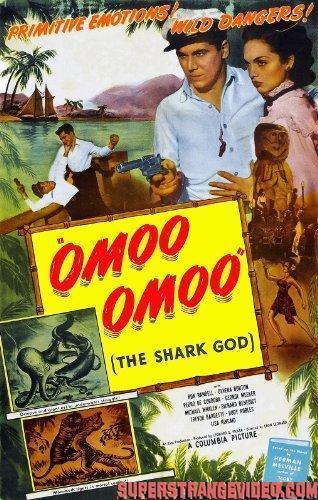
That’s not a still image. That’s how wooden the acting actually is.
One of the pitfalls of being known among your friends as an aficionado of trash cinema is the joyful annoyance of gag gifts. I have several DVD collections of terrible movies, most of which seem to have been selected for titles that can most charitably be called insane. Looking for a film to give the Yakmala treatment to, I settled on Omoo-Omoo the Shark God because I am not a strong enough man to resist a name like that.
Tagline: Primitive Emotions! Wild Dangers!
More Accurate Tagline: Terrible Acting! Baffling Camerawork!
Guilty Party: Herman Melville. This is patently unfair of me to blame Melville, but I had to read Moby Dick in the eleventh grade, so fuck that guy. I have no problem with framing the destructive nature of obsession with the hunt for a giant phallic symbol while a couple of guys cuddle up under some sheets, but did we really need entire chapters on how to butcher whales? Oliver Twist didn’t have extended interludes on the proper way to beat an orphan; that knowledge was assumed. Anyway, Melville wrote the novel Omoo upon which this is supposedly based, but from everything I’ve read, that’d be like blaming Tolkien for the Bakshi Lord of the Rings. But I don’t really care.

Daddy, why has Herman Meville’s zombie returned to take vengeance on us all?
Synopsis: A quick crawl prepares us for a story of native curses and the Omoo taboo in the south seas in 1874. The whole thing is signed by Melville, you know, just in case you had some doubts about its veracity. A small schooner is on the long voyage from San Francisco to the island of Taviti.
A narrator introduces the crew one by one. There’s Richards, the first mate; Texas, a character who completely vanishes from the film after his introduction; Chips, a shady suck up; and Jeff Garland, taking a break from Curb Your Enthusiasm and a great deal thinner for it. There is also Captain Roger Guy, sick and bedridden; his daughter Julie, who has no purpose other than to make the whole enterprise slightly less gay; and our narrator, Dr. Godfrey Long, whose porn-ready name conceals a blandness as thick as bathroom caulking.
Richards discovers a stowaway, and he’s about to throw the guy overboard when Jeff intervenes. A short and oddly girly fight follows, and the stowaway, a Tavitian native named Tembo who speaks in the third person like a really subdued wrestler, is allowed to stay.
The true purpose of the voyage (which was unclear to the entire crew, making this a forerunner to show-favorite Prometheus) involves the eyes of the Shark God. On a previous visit to Taviti, the captain stole the eyes of the Shark God idol, two priceless black pearls. Now misfortune dogs the Omoo tribe and the sickness the captain is dying from is a direct result of this violation of taboo. He’ll only be cured by replacing the pearls, but there are some long, pointless scenes of Tembo giving the captain some medicine, because casual racism is the best thing to pad screentime.
The boat arrives at Taviti, where Tembo’s dad, Chief Tari, greets them. Chief Tari speaks way better English than Tembo, making me wonder what happened there. Anyway, all that remains is for the captain to retrieve the pearls from wherever he’s hidden them, but fuck that, he’s totally keeping them. Richards beats the captain severely, and just before the old man dies, he gives the location of the hidden pearls to Julie. The curse passes on to her, who suddenly decides she wants the pearls, and generally starts acting like she’s been hypnotized.
Richards fools the newly zombified Julie into getting the pearls and starts to escape with Chips, but then decides that a jillion dollars splits better one way than two and shoots the guy. He’s almost to the boat when a tiger shows up to eat him, but Garland decides to use his last bullet on the tiger rather than the man with the gun. Richards shoots Garland for this, and honestly, I was happy to see stupidity rewarded so quickly. Of course, he only wings Garland and does the classic “throw the empty gun” move. Has that ever actually worked?
Tembo rescues Garland by spearing Richards in the back. The pearls are restored to the Shark God, and the curse is lifted.
[image error]
And here’s that scene, shot by a man with cataracts.
Life-Changing Subtext: Other religions are primitive and weird, but don’t steal from them.
Defining Quote: As the captain begins to succumb to the curse in the Omoo village, Tembo takes care of him. There’s a long scene where medicine is administered, followed by a ton of chanting and waving of an amulet. Then, Tembo turns to the doctor and says, “Captain better now.” It’s impossible to communicate how funny this is, but a big part of it is pretending Tembo is just fucking with them. “Yeah, I did the Omoo dance. He’s cool. Now kiss Tembo’s big brown ass.”
Standout Performance: There is a single woman in the Tavitian village, and she’s white. The actress who plays her literally could not be whiter if she was voting for Mitt Romney. She speaks in stilted sentences, wanders around the jungle in an apparent trance, and at one point does a little Omoo dance around the idol. I think it’s supposed to be sexy, but if so, the director probably thought cerebral palsy was the hottest thing in the world.
What’s Wrong: One of the biggest sticking points I had was that Garland and Richards, the hero and villain, wear the exact same costume. There are three scenes of them fighting, but good luck determining who’s who. They both throw punches like they’re trying to gently insert suppositories into the other man.
And then there are shots of jungle fauna that are so incompetent that one looked like an ultrasound.
Flash of Competence: The central idea of a priceless treasure and a native curse isn’t a bad one and could have made for a rollicking and slightly racist action film.
Best Scenes: The film features some stock nature footage that has slightly less artistic import than similar shots in Survivor. While some of it is just quick shots of a monkey in a tree, or a snake in a tree, or pretty much any jungle animal in a tree, two sequences stand out as something more.
The first occurs while the schooner is becalmed. The doctor points out an octopus in some water he earlier states is opaque, but whatever. What follows is obviously someone pissing off a octopus in an aquarium. They shake the poor thing around, throw dead fish at it, and generally bother it until it shoots out some ink and gets the fuck out. The weirdest part is when the doctor posits some kind of esprit de corps among fish. Yeah, they’re schooling, but that’s only so predators will eat the poor bastards on the outside. They’re not the Strategic Fish Services.
The second happens when a pair of tigers throw down while an orangutan and the aforementioned ultrasound look on. I would say this scene exists to establish the presence of tigers for the third act, but that’s giving this movie entirely too much credit.
Transcendent Moment: Richards goes in to see the deathly ill Captain Guy, which still sounds like a generic thing you’d call the head of a ship rather than an actual name. The captain is in bad shape, and they have a long conversation within kissing range. Abruptly, the captain asks for water. As Richards goes to get it, the captain pulls a gun and says that the pearls are his.
Richards hulks out, beats the shit out of the captain, and leaves. Julie goes in and finds that the captain is dying now, but apparently doesn’t notice the bruises that must be covering the old man’s face. He reveals the location of the pearls, but Richards must have beaten the articles out of the captain, because this is what he says: “Trust nobody. Go yourself. Shrine of Shark of God. Find loose stone under left foot.”
Julie, displaying the keen attention to detail and knee jerk racism that served her father well, goes outside and accuses the chief of killing her father with all that crazy native medicine. Meanwhile, Richards just stands there, hoping no one notices his bloody knuckles or the fist prints on the captain’s face.
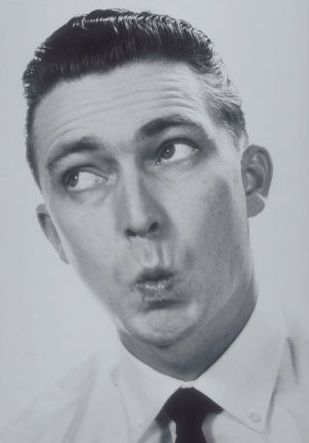
Nope. Nothin’ to see here. Ask the brown guy.
Omoo-Omoo the Shark God is exactly as good as the title suggests. Take that as a warning from the blind Shark God himself.
Filed under: Projected Pixels and Emulsion Tagged: based on a book, casual racism, Herman Melville, Omoo-Omoo the Shark God, Yakmala!

July 5, 2012
Welcome
Welcome to the new home of Mr Blank on the web! Coming soon, we’ll have excerpts, extras, and more – possibly even including a devious little scavenger hunt.
June 29, 2012
Very Special Blossom: Pilot
One of the distinctive parts of growing up in Los Angeles is that you will attend school with working actors. Chances are at least of these people will end up with a recognizable face, and if you’re really lucky, one of them will have a certain ironic cache in around twenty years. There’s no easy way to put this, so I’ll come right out with it. I went to junior high with Mayim Bialik. We weren’t friends or anything. She was two years ahead of me, and therefore wouldn’t really have anything to say, other than the same shared jokes every one of Mr. Mertens’s students have. I think we spoke all of one time, and she was nice. Any ninth grader who’s nice to a scrub is practically a saint in my book, so I’m not here to mock her. The important thing for the purposes of this is that I went to school with Blossom when her fashion sense was more or less normal.
If Blossom the show is remembered for anything, it’s for the preponderance of very special episodes that served as something of a spiritual successor to the Afterschool Special. Since I recently wrapped up that series (which took far longer than I thought it would), I thought I’d move on to Blossom. That, and the fact that my cousin bought me a DVD of ten very special episodes as revenge for me getting him those Afterschool Specials. Might as well write about them then.
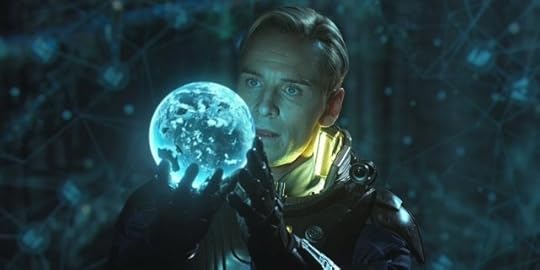
This is the logic that gave us an Alien prequel.
I remember seeing the pilot back in the day, but not much of it really stuck with me. I was dimly aware of the concept of the Very Special Episode, though it was not much more than a simple pejorative I slapped on anything too earnest. Blossom doesn’t seem to be remembered especially fondly, even by people who were fans at the time although it is not lumped in with other oh-my-god-what-were-we-thinking artifacts like Flock of Seagulls hair and Hammer pants. Part of Blossom’s problem is that it was dated almost instantly. Though it added a video diary gimmick that supposedly all the kids were doing and the writing was peppered with risque jokes, Blossom looks and feels like almost every other sitcom of the ‘80s, which is a problem if you’re debuting in 1990. The sets were all brightly lit facsimiles of an upper middle class home, the acting was self-consciously stagey, and the writing is not up to modern standards. As the final nail, Blossom debuted the same year as Seinfeld, the show that simultaneously exalted and buried the three camera sitcom.
The first Very Special Episode is the pilot, which shows that I was wrong in thinking that the Very Special Episode was merely a later misguided gambit to garner critical acclaim and ratings. Turns out that tackling Afterschool Special type problems were part of the mission statement since the word go, although the term “Very Special Episode” was likely the product of some network marketing whiz. Additionally, though we associate Very Special Episodes with Blossom, these were reasonably common in the ‘80s, with the most famous being the episode of Diff’rent Strokes where Gordon Jump molests Dudley. I suspect Blossom went to the well one to many times and has become the standard bearer for these incredibly uncomfortable half hours. The pilot does manage to be hilariously ironic in that it is about Blossom believing her parents are about to get divorced and finding out that nope, everything is fine. In the rest of the show, the mother is gone. So something went seriously wrong between the pilot and the first regular episode.
Much of the running time is devoted to introducing the cast. Her family consists of her accountant dad, stay-at-home mom, and dim bulb brother (called Donnie in the pilot, later changed to Joey). Her eldest brother Anthony is a recovering alcoholic (“He missed 1989,” quips their father. To which I said, “Good. 1989 sucked.”) Alcoholism immediately perked me up, although I couldn’t understand why Blossom’s brother was the drunk and not her mother. Anthony is the one character who breaks out of the standard sitcom mold, his one scene being a series of philosophical musings, observational humor, and bizarre non-sequiturs. The final character is Blossom’s motormouthed best friend Six. I took one look at her and knew, just knew, there would be a teen pregnancy episode before long.
The episode opens with trouble in the Russo household. The parents fight, and true to the show’s somewhat smutty writing, they’re arguing over sex. Seems as though Mr. Russo is neglecting his marital duties in favor of the office. Here’s where I ran into trouble, because a man who does this is cheating on his wife. There’s literally no other explanation. Ladies, even if you’re four hundred pounds, your husband wants to fuck you. Hell, some guys only want to fuck you once you’re four bills. So whatever the show claims is going on here, Mr. Russo has a little side action. Sadly, when Blossom takes the story of the fight to Donnie-Joey, he immediately suggests that dad is having an affair, placing me in the same corner as a man chiefly known for blurting “Whoa!” at the slightest provocation.
Things compound from there, with Blossom obsessing over whether she’ll date Jimmy Olson (no, seriously, her maybe-boyfriend is Justin Whalin), while her parents have a mysterious appointment with a lawyer. Things look bad until Blossom finally confronts them. They were having problems like every married couple, but the lawyer was just setting up their wills. Unfortunately, this doesn’t lead to an ass cancer plot.
This Very Special Episode was essentially a plea to young viewers to be little Fonzies and chill the fuck out. All relationships have problems, and some fighting is inevitable. It’s the classic lesson that just because mom and dad fight doesn’t mean they don’t love each other. Well, in some cases, because in my family it meant precisely that. What these shows never mention is that sometimes divorce is the best of the bad options, as opposed to something that should be avoided at all costs. Oh, well. At least Blossom can go upstairs and dance to “My Prerogative” some more.
Filed under: Puffery Tagged: '90s, Blossom, divorce, Nostalgia, Very special episode








June 22, 2012
Now Fear This: Attack the Block
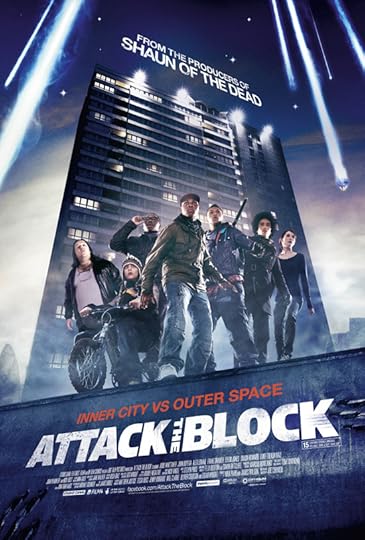
This is why aliens don’t come to the city.
Back when I was trying to break into screenwriting, I consistently got into trouble for my heroes. “Why would I cheer for this person?” the befuddled executive would ask between sips of Diet Coke. “He’s not sympathetic.” I never understood this position, because I was raised on anti-heroes like Mad Max and Snake Plissken. Clint Eastwood did what he did for a little cash. Toshiro Mifune mostly wanted to grumpily wander around and not be bothered. The coolest characters in comics were Punisher, Wolverine, and the Frank Miller versions of Batman and Daredevil. As the heroes of films became blander and blander, I disconnected from them. It wasn’t that I couldn’t identify with their motives, it was that they were too perfect to read as a real person. They ended up less realistic than a special effect; Gollum is a better realized character than anything Channing Tatum has ever played.
I never thought this brand of anti-hero was gone for good, just out of style in the current climate of play-it-safe Hollywood. After all, those protagonists are geared to American viewpoints and the film industry no longer makes movies for American audiences. It’s appropriate then that the finest example of this kind of anti-hero would be a British film, 2011’s excellent creature feature Attack the Block. The ostensible heroes of the piece are a teenage proto-gang introduced mugging young nurse Sam (the extremely British and eerily familiar Jodie Whittaker). The film challenges us to cheer for them by boldly showing them at their worst before gradually revealing their humanity. It’s a risk, but one that pays off, both from the satisfaction of the character arc for the gang’s taciturn leader Moses (newcomer John Boyega) and for giving us a hero whose idea of treating with the aliens is burying a katana in their heads.
Attack the Block takes these characters and faces them with an alien invasion of sorts. Like the best alien movies, the goals of the creatures are never clear, but left for the characters to speculate upon. In this case, that task falls to Brewis, a twentysomething pothead with a fetish for nature shows, so his interpretation of events might not be the most reliable. The trouble stars when what looks like a meteorite slams into a car, interrupting the aforementioned mugging. Moses checks it out and gets jumped by a monster, which then flees into a nearby shed. Not one to be punked out, Moses leads his gang to take a quick and brutal revenge, kicking the thing to death. Unfortunately for them, more aliens fall to earth, and these are much, much bigger and extremely pissed off about what happened to the little one.
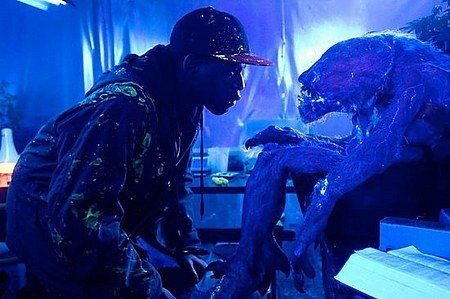
He got to hang out in Ron’s weed room.
In the grand tradition of survival horror, the boys retreat to their home, in this case the titular block, a large housing project in South London, and get ready to fight the bear-sized monsters now intent on eating them alive. They form uneasy alliances with former victim Sam, Brewis the pothead, and Ron (Nick Frost), the local weed peddler, arm themselves with various hand weapons and firecrackers, and do their best. As more and more of these creatures converge on the block, the heroes realize they have to take drastic action if they’re going to save the world, and even more importantly, protect their little corner of London.
Attack the Block is a throwback film. The protagonist’s shaky moral code is only the beginning. The simple plot of kids dealing with aliens recalls classics like Invaders from Mars or even E.T., with the heavy slang suggesting childhood favorite The Goonies. The original creature is a nifty puppet in the tradition of Gremlins. The larger beasts are practical effects, enhanced with CGI. Though just guys in suits, the furry costumes are dyed unnaturally black, helping conceal the human qualities of the performer, leaving the audience instead to concentrate on the one clear feature: the beast’s maw of glow-in-the-dark teeth.
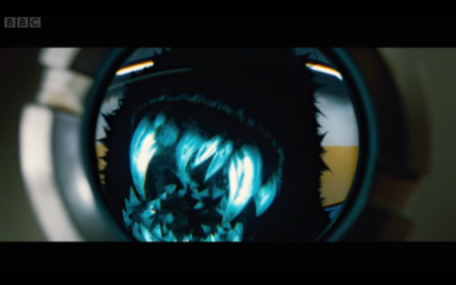
Avon calling!
Moses is fifteen years old, but as Sam learns when she goes into his apartment for the first time, it’s an old fifteen. Once they have achieved a level of trust, he explains his actions, that he never would have mugged her had he known she lived in the block. It’s maybe the most important line in the film, as the rest of it takes pains to show that the block is one thing and the rest of London is something else entirely. The police, when they’re shown, are faceless and in full riot gear. Not as dangerous as the aliens, but certainly as inhuman. The cops are worse than useless, becoming another hazard our heroes must avoid in order to stay alive. They’re the representation of unearned authority: the British government doesn’t give a fuck about the low income residents of the block. The only time they show up is to arrest, assault, and oppress. It’s about time the British cops caught up to our boys Stateside.
Attack the Block is about urban tribalism. Like its predecessor The Warriors, it expertly avoids racism. The heroic gang is mostly black, though it has one and a half white members. The more dangerous drug dealers are pretty much evenly split. What’s far more important than skin color is the realities of living in the block. If you live there, you are a part of the tribe. And as Brewis learns, simply having rolling papers is sometimes enough to grant temporary membership. Cities are incredibly alienating places to live, so we form smaller tribes, either from devotion to the same team, same hobby, or same block. It’s a mostly positive development. Sure, outsiders are in danger, but at least a local woman could walk home at night without the slightest hint of fear.
Though it is a successor to American survival horror, Attack the Block is extremely British. Not that they’re all wandering around sipping tea and wondering what the vicar will think, but they all speak in British accents. Heavy working class British accents, liberally peppered with slang. The first couple scenes with Moses and his pals, you’ll wonder if they’re even speaking English. It gives the movie an authentic, lived in feel. Its nigh unintelligible dialect imparts an identity to the block. By the end of the film, you’ll have picked up their unique rhythms and the dialogue becomes much richer. You’ll immediately forget it afterwards, but that doesn’t matter unless you want to attack the block which we’ve established is a bad idea.
It all comes down to one simple thing. Kids like to play at alien invasion, zombie apocalypse, really anything where they get to be heroes. When I was that age, I had plans for both of them. The sawed off baseball bat in my closet wasn’t for hitting baseballs. In Attack the Block, the young anti-heroes get to do what we all fantasized about. And it’s just as fun as we thought it would be.
Filed under: Projected Pixels and Emulsion Tagged: alien, antiheroes, Attack the Block, Now Fear This











